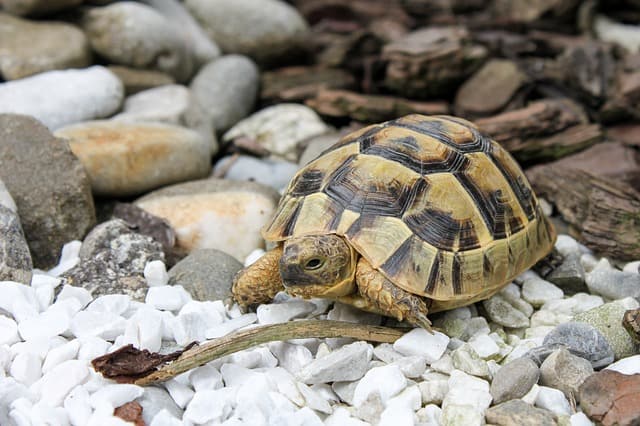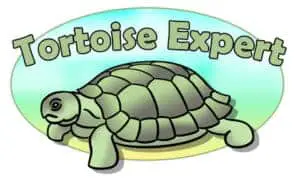
Impaction in tortoises happens when the animal doesn’t pass any droppings. As a result it may also show signs of lethargy or stress. Every effort should be made to prevent digestive tract impaction because a blocked digestive tract can be fatal.
Tortoises can experience a range of different health problems, which arise for various reasons depending on the individual in question and its circumstances. Some issues are not that severe, such as respiratory infections, while others, such as impaction in this case, can be life-threatening.
I have not had to deal with impaction, at least not in a form that is life threatening, although my tortoise may have at times ingested objects that he should not have, I always make sure to check his enclosure for small stones and other offending items.
In tortoises, impaction of the digestive tract can occur for several reasons, and it is not always easy to avoid it altogether. However, it is important to be vigilant, because not treating this problem can actually lead to the death of the reptile. If you notice what you suspect to be signs of impaction in your tortoise it’s necessary to find out if your assumption is correct, and if so, how it can be treated, as well as what may have caused it so you avoid the problem in the future.
This article will tell you more about impaction in tortoises and will help you handle the problem.
What Causes Impaction in Tortoises?
Some of the causes of impaction are fairly obvious, while others may even surprise you as you likely never considered that they could be harmful. Here are some common root causes that may lead to impaction:
- Using the Incorrect Substrate
Not using the right substrate is almost certainly the most common reason why a tortoise may suffer with impaction. Many substrates are not ideal, because tortoises may end up ingesting parts of them.
Substrates that are dangerous include cat litter, sand, corn cob, walnut shells, or anything else that is made up of hard, fairly large and non-digestable material. If the tortoise ingests any of these substrates, impaction and blockages may develop in their gastrointestinal system.
This is just one of many reasons why these days we only recommend using coco coir or topsoil as your substrate of choice.
- Stones in Substrate
Substrates that contain stones can also be dangerous. Once again, the tortoise might end up ingesting these stones by mistake, which in turn causes impaction.
Stones can be particularly problematic in outdoor enclosures where your tortoise is left to roam on ‘unvetted’ ground, which may contain stones you are unaware of.
A good tip is to check the ground in your outdoor enclosure at the end of each day, to see the state of the ground your tortoise may have churned up. If new stones have been revealed, you should of course remove them.
- Incorrect Diet
Believe it or not, even an improper diet may cause impaction in tortoises. In general, this may be the result of overfeeding the reptile, or not giving it enough water for hydration.
In other words, whilst the food itself may not be harmful under normal circumstances, when eaten in large quantities without enough water it can behave just as any other foreign object in the digestive tract.
- Intestinal Parasites
Infection with intestinal parasites may also be the culprit when it comes to impaction. Parasites affect the gut’s mobility (making the passage of food a lot more sluggish). The gut will then empty far more slowly, perhaps so slowly in fact that it may result in impaction.
If you suspect your tortoise may have intestinal parasites, a visual check of the feces may indicate the presence of tiny thread or pin worms. Although an unpleasant task, this is worth doing every few weeks as a double check, however it is important to note that the only way to be completely sure of the presence of intestinal parasites is to have a fecal test carried out under lab conditions.
There are several worm test kits available from various manufacturers online, but it may be worth consulting with your vet as to how best interpret the results of such a test.
How Can You Avoid Impaction in Tortoises?
Impaction can be avoided if you’re careful, and as with most things, it’s best if you take measures to avoid it from happening in the first place, rather than having to treat it later on.
First of all, you should consider buying the right substrate for your pet. Ideally, if you’re using a substrate that is a ‘no no’ you should make the change to a safe alternative immediately.
I was unsure about mentioning this, but avoiding impaction is possible by using newspaper to line the floor of the enclosure. Whilst not a ‘substrate’ in the traditional sense, this is not only safer than many commonly touted options, but it is also easier to replace every day (if required) while being an affordable option.
However, unshredded newspaper cannot be burrowed into, and if shredded presents a strangulation risk, so it should be used with caution.
Once again, the most popular tortoise substrates include coconut coir, organic soil, soil & coconut coir mix, and peat moss.
Whether indoors or outdoors, you need to make sure the substrate is free of items like stones or any big pieces that your tortoise may end up ingesting. It’s best to avoid placing small stones in the enclosure, as they can be a danger for the pet.
Larger stones (ie stones too big to fit into the tortoise’s mouth) can be used to add interest and as ‘door mat’ around the tortoise’s water dish to avoid substrate contaminating their water.
Furthermore, you must offer the tortoise the right diet and make sure that you don’t overfeed it.
Finally, ensure your tortoise is always hydrated, since dehydration may increase the chances of impaction in some cases.
How Do You Recognize Impaction in Your Tortoise?
If your tortoise is dealing with an impaction issue, there will be some signs that you will begin to notice, although they may be subtle at first.
The tortoise’s behavior will slowly change, and you will notice a few changes in the enclosure as well.
- Lack of Droppings
First things first, the tortoise may stop defecating, which should be alarming to you. If you are aware of your tortoise’s habits, then you will surely start to notice if there is a lack of droppings in the enclosure. Once you are sure this is the case, it is time to take action to make sure things don’t get worse.
As if to make life difficult however, tortoises are notoriously infrequent poopers, so you really will need to pay attention to take note of when they actually have emptied their bowels. This will give you get a better idea of just how infrequent their toilet habits are, and when there is reason for you to be concerned.
- Lethargy
Lethargy is a very common symptom during impaction. Even if your tortoise is not the most active, you will still be able to notice if it’s too sluggish.
All of a sudden, your tortoise may start being inactive, and won’t even react to the food you place in front of it for several days or more. It may just stand in a spot most of the time and sleep.
- Eating Less than Usual
Changes in eating behavior represent another sign that your tortoise may be dealing with an impaction issue. If your tortoise suddenly stops being interested in its favorite food, it may be cause for concern, although it is by no means conclusive. Try looking for other signs along with a lack of appetite that may indicate impaction is the cause.
- Difficulty Breathing
Sometimes, tortoises suffering from an impaction problem may also find it harder to breathe, and you will be able to see if the reptile seems to have difficulty breathing all of a sudden. You will know this is the case if the tortoise is making strange head movements and extending its neck to try and clear its airway.
This is more likely to happen in cases of more severe impaction, so you should take the tortoise to the vet as soon as possible if you notice this sign.
How Do You Treat This Problem?
First of all, you should try soaking the tortoise in warm water. In some cases, this works against impaction, but only if the issue is not too severe. If it doesn’t work, you should, of course, take the tortoise to the vet immediately.
A veterinarian will probably use X-rays to find the issue, and may organise one of the aforementioned tests to detect potential parasites.
The tortoise will then have to go through surgery to remove whichever object ended up inside its body and caused the impaction. Any impacted feces will also be removed.
Final Thoughts
Tortoise impaction can be avoided if you make sure to maintain the right diet for your pet and if you use the right substrate in the enclosure. The substrate should be safe and contain no objects that the pet might ingest. And always remember that not preventing or treating this issue can be fatal.



